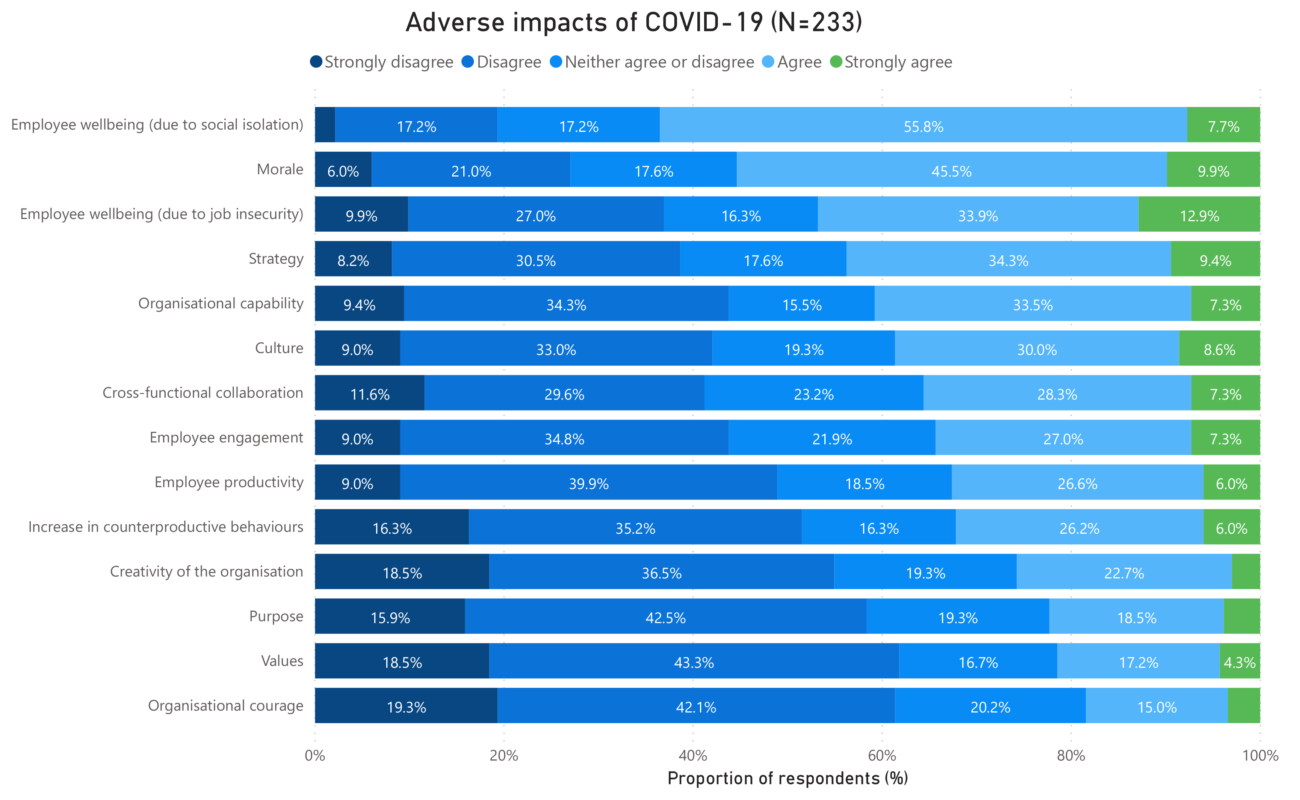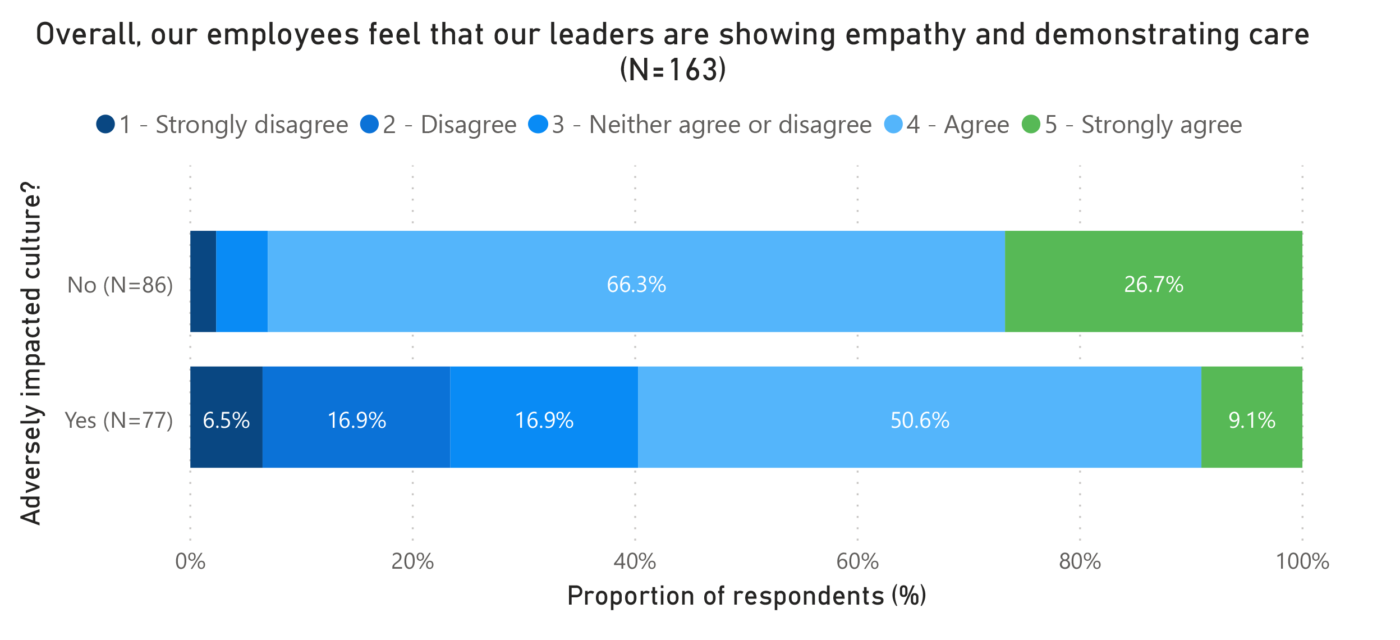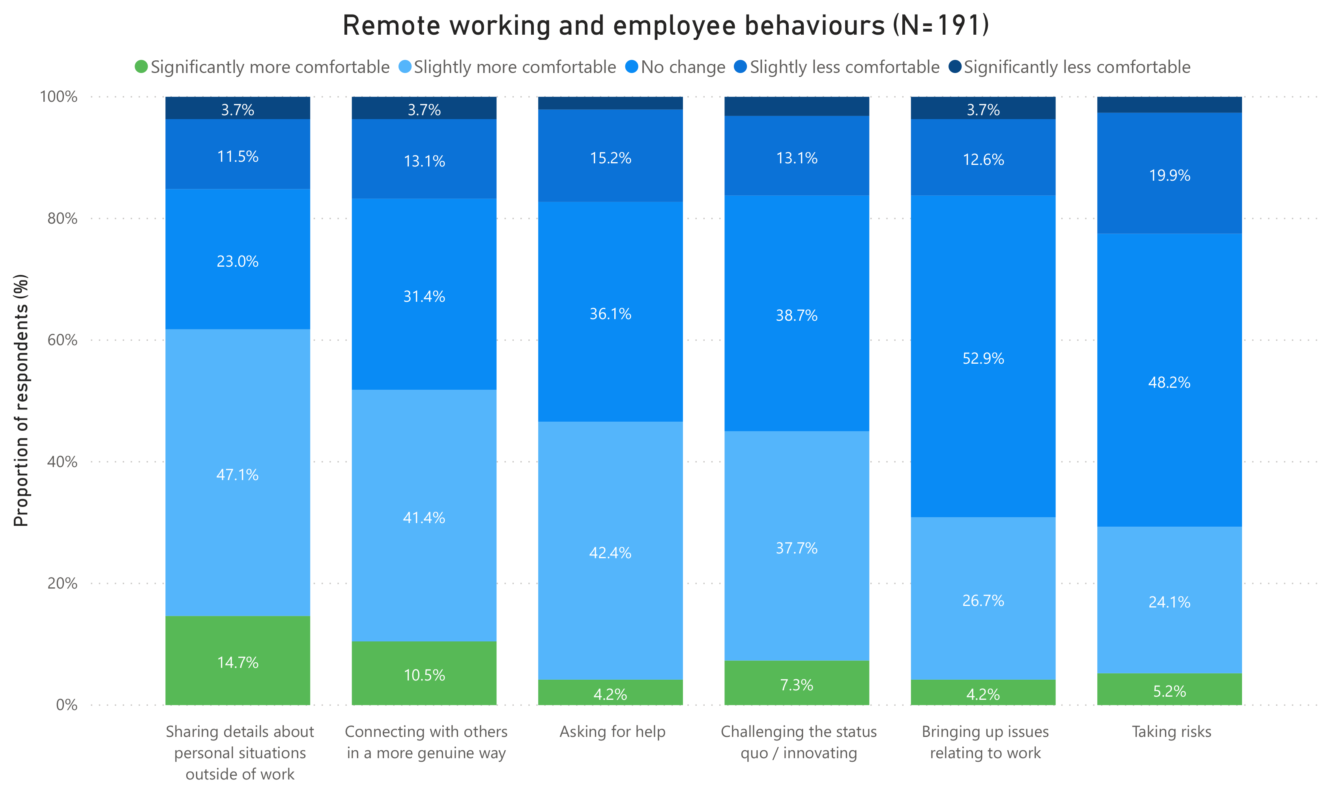Workplace culture has been a significant factor in how different organisations have responded to the challenges of COVID-19. But the pandemic is also shaping these same organisations’ cultures, both positively and negatively.
Culture is an essential part of the workplace. It’s a selling point in recruitment drives. It’s what gets many employees out of bed in the morning. And for HR practitioners responsible for driving that culture, it can be one of the most fulfilling and frustrating parts of the job.
Enacting cultural change is no easy job. Even well-intentioned cultural changes can fall on deaf ears when “this is how we’ve always done it” is the workplace motto. But 2020 has taken everything and turned it upside down, forcing us to change our behaviour in the blink of an eye.
So it’s not surprising that almost 85 per cent of respondents in AHRI’s “COVID-19’s impact on culture” report said COVID-19 has forced their organisation to “see, think, feel, plan and act differently”.
The report surveyed over 230 HR practitioners from across the country about the impacts COVID-19 has had on their organisation’s culture.
Wellbeing has taken a blow
While COVID-19 is an indiscriminate virus, the impact it has had on different organisations has varied. Respondents were almost evenly divided on whether the pandemic had positively or negatively affecting their organisational culture, 42 per cent and 38 per cent respectively.
Employee wellbeing was the area most adversely affected either due to social isolation (63.5 per cent) or job insecurity (47 per cent). More than half the respondents said morale had also taken a hit.

Interestingly, areas like organisational courage, values and purpose – elements that tend to influence wider workplace culture – were the least impacted. In fact, more than one in two respondents said remote work had revealed their “organisation’s values are more important than before”.
Some respondents believed the crisis had brought them closer together and forced the organisation to look closely at individuals’ contributions in ways they hadn’t before.
Several respondents noted that employees were more in tune with each other’s needs and able to adapt as required. One said: “we can come together quickly and pivot to protect and care for our teams”.
Martha Hutchinson CAHRI, human resources manager at Balgowlah RSL Memorial Club, saw this happen with her workforce. The RSL was forced to close due to government regulations during the first wave of lockdowns earlier this year and Hutchinson had to stand down almost all of her staff.
Though she managed to bring many back on JobKeeper, she says her workforce is still reeling.
“It has been an absolute shock to the staff that this is happening. I mean, if you think back, you think about our grandparents going through World War I and World War II, this is the first time this younger generation has seen anything like this. And I think it’s a real surprise to them,” says Hutchinson.
“But we have a really tight knit group here. They have been very receptive to it and very responsible to do what was asked of them.”
What role can leadership play?
Like most workplace issues, employees are looking to leaders for guidance during this time but not everyone is finding it. One respondent said, “Our leaders have been great leaders in good times, but not in challenging times and our culture has suffered because of them”.

Participants overwhelmingly felt their leaders had the skills to do their job during the crisis (79 per cent) but only half of the respondents felt their leadership team was “energising the organisation” and even less felt their leaders were addressing their own shortcomings (42 per cent).
Of the respondents who felt their workplace culture had been adversely impacted by COVID-19, around 23 per cent say employees don’t feel as if leaders are showing enough empathy or demonstrating care.
This raises some interesting questions around what “skills and competencies” we expect of leaders. If employees feel their leaders are competent but they’re not appropriately caring for their workforce, perhaps there needs to be a shift in what roles we see leaders fulfilling in times of crisis.
This is an area Emma Montrose, people and culture lead at payment service provider Littlepay, says is important for workplaces to address. Remote work wasn’t a shock for her employees as they often work within different time zones and flexible work has always been on the table.
But that’s not to say it has been smooth sailing. There were plenty of tweaks needed to help the organisation’s culture continue to thrive during the pandemic. Leadership transparency and vulnerability went a long way in making this happen, she says.
“Earlier this week, our CEO admitted he’d been struggling with homeschooling the kids. So he’s replanned his workday to start the morning with a walk, then he does a few hours of work, logs off for a few hours to homeschool the kids, then starts working again in the afternoon. By sharing his story, it sends a really clear message to employees that restructuring your own time is okay – it says ‘this is the cultural norm here’.”
“That’s where some organisations get it wrong. They have this policy about flexible work that’s just an HR buzzword, but it’s not actually lived.”
Montrose says when leaders show vulnerability it demonstrates that they truly understand what employees are going through. It also releases some pressure from employees who may feel like they need to have it together all the time.
She says it is easy for positivity to become toxic if we expect everything to have a positive spin.
“Too much positivity can be toxic; it can invalidate the experience of those who are struggling. And people are really struggling with the impacts of COVID-19, especially here in Melbourne,” she says.
“It’s hard to think of the future when you don’t know how long restrictions are going to be in place for. It’s hard to be creative and innovative when that’s at the back of your mind… Now is the time where we really need compassionate and empathetic leaders.”
Download AHRI’s report COVID-19’s impact on culture for more insights.
Culture and remote work
One of the biggest lessons learnt from this crisis is that we can adapt quickly to remote work. Four in five respondents said they felt working from home was “more achievable than previously thought”. Three quarters said they were more open to remote work as a result of COVID-19.
Interestingly, moving to remote work made some employees more comfortable with sharing personal information about themselves. More than half the respondents said employees were connecting with each other in a “more genuine way” than prior to the pandemic.

It could be that isolation has made people feel more connected to those they speak to regularly, or the fruit of organisations making more of an effort to include social events for employees to interact online. Montrose says this is particularly important when it comes to new employees.
“We’ve had people start in the team and have been working with us for months who have never met their colleagues face to face. It’s really hard to form those genuine connections when you’re working remotely. You can’t just take them out for a Friday night drink and get to know them on a social level,” she says.
“We’ve had to formalise those social interactions a bit more, which can seem a bit forced, but it’s necessary.”
Even though employers know these events are important, structuring them isn’t easy because different employees have different needs and wishes.
“For us, probably the biggest challenge was to try and balance the needs of those who thrive on regular interaction with their colleagues and those who are happy to lock themselves in a room and code for 12 hours,” says Montrose.
Fostering culture online is a particularly difficult hurdle for HR at this time. Over 70 per cent of respondents agreed building culture in a remote workforce was a challenge. However, only a third felt culture had been adversely impacted by remote work. So there are plenty of employers out there who are getting it right.
While we can’t predict exactly what the future holds, over three quarters of respondents said they were likely to act upon the opportunities of this crisis in the long term. Montrose says the impacts will be with us for a while yet so it’s on leaders to stay focused and in-tune with their team’s needs.


I’d just like to note that this survey excluded HR consultants such as myself who specialise in supporting SMEs that cannot afford permanent in hour HR and Fair capabilities.
At ahum, we are working with clients looking at new ways to foster culture online by using private/internal podcasting as a way to stay connected to the mission/purpose and to each other as colleagues.